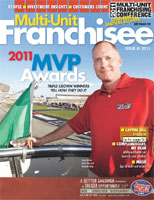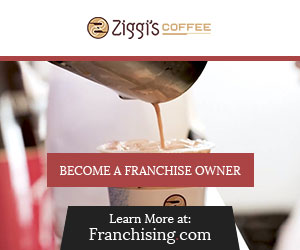The Big Applebee: "My Biggest Role Is Being A Cheerleader"
Zane Tankel doesn't think of himself as a bleeding heart. He's been repeatedly recognized for his ability to build a hefty bottom line. But he also isn't afraid to show how much he cares about the thousands of people who work in his 35 Applebee's locations scattered around the Big Apple and its suburbs.
Over the past 15 years, Tankel's franchisee group, Apple-Metro, has created one of the most generous bonus systems in franchising. GMs and kitchen managers in his organization are given a car after they've put in 18 months. They also get a cell phone and free service. There are bonuses for top players, even free movie tickets for the hourly employees who get special recognition for guest services. More than 100 managers and wives or significant others qualify for the company's regular cruises to Bermuda. And no day would be complete unless he stopped by a few of his restaurants in his never-ending pursuit of employees who deserve some face-to-face praise.
"My biggest role is being a cheerleader," Tankel says as he steers his car to one of his restaurants in Queens, where employees are in store for some personal praise from the boss after winning a decorating contest for Cinco de Mayo. "I pat people on the back."
It's that kind of hands-on management that has helped Tankel survive and thrive in some of the toughest neighborhoods in the U.S. Places like Bedford-Stuyvesant, the South Bronx, and Harlem. He took a restaurant franchise designed for the suburbs and medium-sized towns and built the franchisors' first two-story location on Times Square, where it quickly turned into a stellar success and a model for similar locations to follow.
But he attributes all of his success to the people who make up his extended family of restaurant employees--from the best GM to the last person hired to wash dishes. And the 68-year-old won't rest until everyone in the group feels the same commitment and enthusiasm he brings to the game every day of the week.
"It's all social," says the CEO. "It's about being a family. Being a team. And we're a team of about 3,000. Bed-Stuy has a 50 percent unemployment rate. We hired a couple of hundred people there. In the last three locations we opened in urban neighborhoods, we had over 5,000 people apply for 150 to 200 jobs. It gives you a sense of what's going on in these neighborhoods. We're happy that a mother and her family can come in and have a price-friendly meal."
"I won't say we're philanthropists," says Tankel. "We bring sit-down table service restaurants to communities that others don't or won't serve. And our metrics on food, liquor, and labor lead the whole Applebee's system."
One other metric that he likes to discuss is Apple-Metro's low employee turnover rate in a business where people typically come and go on a daily basis. Every time a manager leaves his Applebee's family, there's a costly new round of recruitment and training in store. So he's quick to tell you that what may look like overgenerous perks and bonuses is really just good business. To earn the car and the phone and the cruise takes commitment and a winning attitude, and is how you make a large organization into a top performer.
"It's all about retaining your people and making them feel like they're really, really part of it," says Tankel. "You might have good retention, but it doesn't mean that they're happy campers."
For more on Tankel's earlier days in franchising and outdoor exploits (including climbing Mt. Everest) see his 2005 profile at www.mufranchisee.com/article/113/.)
Questions
Name: Zane Tankel
Title: Chairman and CEO
Company: Apple-Metro
No. of units: 35 Applebee's
Personal
Age: 68
Family: Wife and two daughters
Years in current position: 15
Years in franchising: 15
Key accomplishments:
We opened the first New York City Applebee's in Times Square on 42nd Street, the crossroads of the world. Applebee's is traditionally a suburban place. You park your car in the back. We put one smack in the heart of Manhattan. Two stories. It was unheard of. Now it's the largest Applebee's in the world, with 20,000 guests a week.
Biggest mistake:
I guess trying to branch out. At one point we had four different concepts. That diluted our focus.
Smartest mistake:
The 42nd Street location, without a doubt. We're now planning a three-story restaurant in midtown Manhattan and we have two more deals in the offing.
How do you spend a typical day?
I don't have a typical day. But generally I get up at 6:30 to 7:30 a.m. and work out--unless I have an early morning meeting between 7:00 and 9:00 a.m., which is generally two or three times per week. I do martial arts, weight training, ride my bike. Between 9 and 9:30, I get on the computer, read all my emails (I get several hundred a day) and figure out which ones I need to answer before noon. Then the rest of the day and into night up until 11 or 12, I spend visiting our restaurants. I wear jeans and a shirt. I don't dress to impress people. I dress like our folks dress. I stick to one neighborhood. If I go to Queens I'll just visit restaurants in Queens, and we have six. I'm headed to Queens now in fact. We ran a contest for decorating the restaurant for Cinco de Mayo and this one restaurant won the contest. I want to congratulate them.
Work week:
There is one day, Tuesday, when we meet in the office. We have an agenda, there's a steering committee I chair. We are all partners: Roy Raeburn (with whom I founded Apple-Metro), who's in charge of remodels and maintaining restaurants, is president; Miguel Fernandez, COO, runs day-to-day operations; and Frank Venice, who I've been working with in various businesses for 34 years, is CFO.
Favorite fun activities:
Everything I just told you. I love it all.
Exercise/workout:
I'm a cyclist, and I enjoy martial arts. I spar one or two days a week. And I love to travel. I'm able to travel a fair amount.
Favorite stuff/tech toys:
I have them all: two phones, a BlackBerry, and an iPad.
What are you reading?
I'm reading a few books right now. I'm reading one by Ahmed Rashid on the Taliban and Descent into Chaos, about Pakistan, also by Rashid.
Do you have a favorite quote or advice you give?
I have a lot them. "There are none so blind as those who will not see."
Best advice you ever got:
To have a friend you must be a friend.
Formative influences/events:
The Young Presidents' Organization had a big impact on me. I was able to interface with people and I traveled the world. It sucked you in. I also went to the Wharton School of Business. That also had a big influence on my life. And, of course, my wife, who tends to give me balance and keeps me grounded.
How do you balance life and work?
I don't need to balance them. You can't separate them. They're really one. It's who I am.
Management
Business philosophy:
You have to be the best at what you do, and you have to understand that to be your best you have to look after and respect your people.
Would you say you are in the franchising, real estate, or customer service business? Why?
We're in the people business. We have internal and external customers. It's all about people, whether they're internal or come in as a guest. I can't order someone to be nice. We want it to be part of your personality.
What gets you out of bed in the morning?
I absolutely love seeing our people grow. We go into neighborhoods where people don't go in, and we hire people who might not be considered productive citizens. And I watch them grow into managers and GMs and it's an absolute thrill. I'm talking about gang bangers who over 5 years go from dreadlocks to short dreads, from being covered in tattoos to covering up the tattoos with long-sleeve shirts.
What's your passion in business?
Winning!
Management method or style:
I think I'm very much a motivator.
Greatest challenge:
Continuing to grow good people. That's what it is all the time. I don't want to make it sound like Pollyanna. We don't win all the time. Our challenge is to get people who want to become a manager great, not just good.
How close are you to operations?
Very close.
Personality:
Type A times two.
How do others describe you?
You should ask Miguel Fernandez, our COO, and the person I interface with most. (We did):
Fernandez: This is my opinion and the general consensus of people who know Zane. Zane is a great visionary in the business world. But not just with numbers. He's a visionary of concepts. He's sensitive to caring about people. Most CEOs are conservative, pragmatic thinkers. Zane is the opposite. He's a risk-taker. He works on a whole different wavelength than anybody else and sees things that I don't see and other people don't see. His thinking is never around how much money we make. The money is usually a byproduct. That's way down the scale of priorities. It's about the brand. And how do we improve our people's lives? That is 99.9 percent of the time the foundation around his thinking process.
How do you hire and fire?
We have a full-time recruiter who just interviews people all day long. When she thinks someone fits our profile, and we're pretty particular, our director of human resources and the area director interview them. Firing is up to the GM. He's the only one that can fire people with the approval of the area director.
How do you train and retain?
We have a very elaborate and extensive training program lasting three months. Then every year we hold "Spring Training" for all managers, broken into groups of approximately 30 people. It lasts an entire day.
How do you deal with problem employees?
We do not have a procedure. We put one in and I threw it out. Everyone is different. We had progressive discipline for a short while. For certain people it works and for others it doesn't. I don't think you can put people in a slot. It's all done case-by-case now.
Bottom Line
Annual revenue:
$140 million
2011 goals:
We're going to build a few more big restaurants with the capacity to beat 42nd Street and continue to get better as we go. We're not getting there at $140 million. The goals are to refine, get better. You have to be like a ball club and practice every day. Why? There is no there, there. You need to continue to practice and refine. You need to be on top of your game.
Growth meter: How do you measure your growth?
Sales is certainly one way.
Vision meter: Where do you want to be in 5 years? 10 years?
I really can't tell you I have a defined goal. I'm physically fit and I love what I'm doing. I want to keep doing it as long as I can. I think about it. But I don't see anything more than what I'm doing. I tell people I have my dream job.
How has the most recent economic cycle affected you, your employees, your customers? Are you experiencing economic growth/recovery in your market?
We've grown through it all. We've just grown more. In '07 we had no idea of the depth or breadth of the downturn at that time. But what we said was that while we're in this downturn there will be tremendous opportunities. There's great real estate that we couldn't have touched in New York City. In the past, if there was a great site, the owners wanted a million dollars for it. Now you can also get things built for great prices--there's a 30 percent unemployment rate in construction. Now we can find great staff, which was an issue. So there was tremendous opportunity. We just had to take our time, go into it, and in '08, '09, and '10, we built a dozen restaurants.
What did you change/do differently during the recent tough economic times that you plan to continue doing into the future?
We just used the downturn to make people more aware of how fortunate we are, and in turn how fortunate they are. We have to give people a compelling reason to come into our restaurants. They can spend their hard-earned money anywhere. We don't want to give them discounts. We used the downturn to educate our people and get them on point, and will continue to do so.
How do you forecast for your business during trying times? Can you even forecast at all?
We've been very good with forecasts. We do budgets every year. The general manager does theirs and it goes to the area director for approval. He signs off and they go to the director of operations, and he signs off. And then they are forwarded on to the finance department. We want to make sure there are no softballs being lobbed over the plate. We throw them back if you didn't stretch--and if there's too much stretch we also throw them back. Every week our computer program gives us theoretical and actual costs. We're pretty much right on between the actual and theoretical.
Where do you find capital for expansion?
We've been very fortunate with our metrics and numbers. There's a lot of money out there. The issue is creditworthiness. Banks are dying to give money to creditworthy people. We refinanced just a year ago.
Is capital getting easier to access? Why/why not?
From what I read and what I hear, no, it's not. But by my own experience, it was never difficult. It was difficult 15 years ago, when I was in printing.
Have you used private equity, local banks, national banks, other institutions? Why/why not?
National banks.
What kind of exit strategy do you have in place for your business?
I don't have one.
What kinds of things are you doing to take care of your employees?
The list goes on and on. We hand out bonuses every month at our restaurants, based on the metrics they hit. We have a bunch of metrics: top line, turnover, bottom line, food, liquor, labor; all have a percentage attached to the bonus. Thirty days after the period is closed, we give out bonuses. That's for all managers. For hourlies, when a guest sends in a compliment we send them a letter and we give them two movie tickets. You make people better by working on their positives.
How are you handling rising employee costs (payroll, healthcare, etc.)?
The biggest thing no one looks at is turnover and we work real hard at minimizing turnover, even the hourly positions. In our company we spend a week on the floor following a new server. What does that cost you? It's millions of dollars but not hard dollars. A manager is training for three months. You hire a guy for $55,000 and a quarter of that, $14,000 in the first year, is just training. For 10 managers it's $140,000, just in rehiring and retraining. And then if they're not productive right away, there's another transition.
How do you reward/recognize top-performing employees?
Area developers get a piece of their restaurants. They have a desire, passion, and incentive to succeed.
2011 MVP AWARD WINNERYou were recognized for demonstrating outstanding performance and innovation in growing your organization and brands. Tell us what you did. As a multi-unit franchisee, how have you raised the bar within your organization? What innovations have you created and used to build your company? What core values do you feel led you to win this award? |
Share this Feature
Recommended Reading:
FRANCHISE TOPICS
- Multi-Unit Franchising
- Get Started in Franchising
- Franchise Growth
- Franchise Operations
- Open New Units
- Franchise Leadership
- Franchise Marketing
- Technology
- Franchise Law
- Franchise Awards
- Franchise Rankings
- Franchise Trends
- Franchise Development
- Featured Franchise Stories
FEATURED IN

Multi-Unit Franchisee Magazine: Issue 3, 2011

$300,000
$750,000





 The multi-unit franchise opportunities listed above are not related to or endorsed by Multi-Unit Franchisee or Franchise Update Media Group. We are not engaged in, supporting, or endorsing any specific franchise, business opportunity, company or individual. No statement in this site is to be construed as a recommendation. We encourage prospective franchise buyers to perform extensive due diligence when considering a franchise opportunity.
The multi-unit franchise opportunities listed above are not related to or endorsed by Multi-Unit Franchisee or Franchise Update Media Group. We are not engaged in, supporting, or endorsing any specific franchise, business opportunity, company or individual. No statement in this site is to be construed as a recommendation. We encourage prospective franchise buyers to perform extensive due diligence when considering a franchise opportunity.